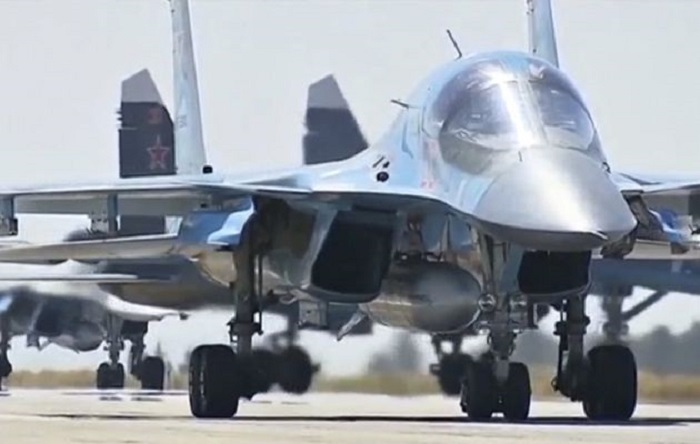UN peace envoy Staffan de Mistura described the pullout as a “significant development” for the talks that began in Geneva on Monday in the latest push to end the five-year conflict, but Western leaders were more cautious.
“We hope (this) will have a positive impact on the progress of the negotiations,” de Mistura said in a statement.
President Vladimir Putin on Monday ordered the “main part” of his forces out of the war-torn nation but the Kremlin denied it was trying to pressure its long-time ally President Bashar al-Assad.
Putin said Monday that Moscow’s military goal had been “on the whole” completed some five-and-a-half months and 9,000 combat sorties after the Kremlin launched its bombing campaign in support of Assad.
State media broadcast live footage of flag-waving crowds greeting pilots out of their aircraft at a military base in southwest Russia as a brass band played.
Russia will, however, keep a contingent at its air and naval bases in Syria and a senior military official suggested Moscow’s planes could continue striking targets.
“It is still too early to speak of victory over terrorism. The Russian air group has a task of continuing to strike terrorist targets,” deputy defence minister Nikolai Pankov was quoted as saying by Russian news agencies at the Hmeimim base in Syria.
Western leaders reacted cautiously, with Moscow yet to specify a timeframe for completing the withdrawal and a Kremlin official insisting Russia will also keep advanced air defence systems in Syria.
Hopes for a breakthrough in Geneva remained remote, with both sides locked in a bitter dispute over Assad’s future as the conflict entered its sixth year.
De Mistura was expected to hold his first official meeting with the opposition High Negotiations Committee (HNC), which has repeatedly said that Assad cannot be part of Syria’s political future.
The regime insists his removal is a “red line”.
Kremlin spokesman Dmitry Peskov said it was “not possible” to infer that the Kremlin was angered by Assad’s perceived inflexibility.
In February, Russia was unusually critical of Assad after he vowed in an interview with AFP to retake the whole country, saying his stance was “not in accord” with Moscow’s diplomatic efforts.
Western diplomats expressed hope the Russian withdrawal could push the Syrian leader to negotiate.
“If the announcement of a withdrawal of Russian troops materialises, this increases the pressure on president Assad to finally negotiate in a serious way in Geneva,” German Foreign Minister Frank-Walter Steinmeier said.
Russia’s UN envoy Vitaly Churkin also said the move would boost the chances of a diplomatic solution to a conflict that has killed more than 270,000 people and displaced millions since March 2011.
The White House said President Barack Obama had spoken to Putin following Russia’s announcement, and discussed the “next steps required to fully implement the cessation of hostilities”.
But US officials offered a cautious initial assessment.
“At this point, we are going to see how things play out over the next few days,” a senior administration official told AFP.
Russia began air strikes in support of Assad’s army in September, a move that helped shore up the regime’s crumbling forces and allowed them to go on the offensive.
Russia sent some 50 warplanes to carry out thousands of strikes across Syria, saying it was targeting “terrorist” groups including Islamic State jihadists.
The intervention was slammed by the West and its regional allies, which insisted that Moscow was mainly bombing more moderate rebels fighting Assad.
A temporary ceasefire between Assad’s forces and opponents introduced on February 27 has largely held, but does not cover IS and Al- Al-Qaeda’s Syrian affiliate the Al-Nusra Front.
A jihadist commander told AFP that Al-Nusra was preparing to launch a new offensive “within the next 48 hours”.
Syria’s main opposition welcomed the Kremlin announcement, but said it would wait and see the impact on the ground.
“We must verify the nature of this decision and its meaning,” HNC spokesman Salem al-Meslet told reporters in Geneva.
After his first official meeting with the regime on Monday, de Mistura told reporters that “strong statements (and) rhetoric” were part of every tough negotiation and that his initial discussions with government representative Bashar al-Jaafari were “useful”.
[Source: The Citizen]





 WhatsApp us
WhatsApp us 

